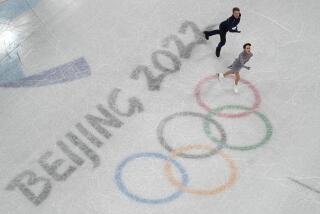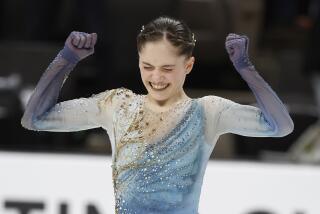Action on Scoring Gets Deep Freeze
- Share via
KYOTO, Japan — Despite members’ exhortations to explore reforms that would repair figure skating’s damaged credibility, the International Skating Union Congress became bogged down in tedious matters Thursday morning (Japanese time) and did not get to the most vital topic on its agenda.
While votes were taken on matters such as whether referees must possess “a good knowledge of English” or “a very good knowledge of English,” discussion was delayed on potentially momentous changes to the sport’s scoring and judging systems proposed Wednesday by the U.S., Australia, Canada and the ISU Council.
The Congress is scheduled to end Friday (Japanese time) after holding elections.
“We’ll probably reach some sort of resolution, but whether we’ll be able to implement it for next season, I don’t know,” said Don McKnight, president of Ice Skating Australia. “The ISU proposal certainly can’t be implemented immediately. We need another week--or another few days.”
The figure skating delegates were expected to meet into the evening hours Thursday to examine the reform packages and attempt to bring about the meaningful change sought by ISU President Ottavio Cinquanta.
“It’s very hard to pull all these pieces together,” said Phyllis Howard, president of the U.S. Figure Skating Assn. “Still, we feel something needs to be done.”
The U.S. proposal, which centers on ranking skaters by a median score and creating five geographical zones from which judges would be selected, appeared to have solid support. It could be implemented more quickly than the ISU project, which will require years of testing and study.
“The U.S. always carries weight simply because it’s the U.S.,” McKnight said. “But I think everyone will be given fair consideration. I’m hopeful we’ll get a satisfactory compromise, which is what it’s all about. We need to make it better. It doesn’t matter whose proposal it is.
“I think I have a lot of support. People keep telling me how good it is, but I don’t know if they’re telling everyone else the same thing.”
A proposal that would have given singles skaters a bye in the qualifying rounds at the world championships if they or their country placed in the top 20 at the previous world competition failed to get a two-thirds majority and was rejected.
Delegates approved the awarding of a 6.0 to performances that are “outstanding” as opposed to “faultless,” although the point would be moot if the ISU cumulative points system is adopted.
Meeting separately, speedskating delegates voted to use video replay in short-track competitions to settle protests when cameras are available, such as in televised competitions. The referee will evaluate the replay immediately after a protest is lodged verbally or in writing, and must reach a conclusion before the start of the next event.
More to Read
Go beyond the scoreboard
Get the latest on L.A.'s teams in the daily Sports Report newsletter.
You may occasionally receive promotional content from the Los Angeles Times.







